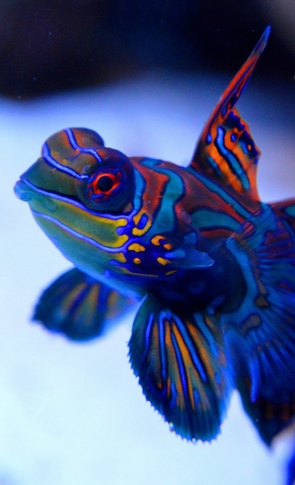Nitrates, polyatomic ions, and phosphates, polyatomic anions, are two powerful eutrophicating agents (a process by which nutrients, in this case pollutants, accumulate in an environment) for your reef aquarium. Nitrates develop during the final phase of the nitrogen cycle (resulting from nitrogen nitrification). Phosphates, on the other hand, are chemical compounds made up of “phosphorus” and “oxygen” ions (Po4), present in almost all living marine organisms. They are therefore primarily ejected as biological waste by your tank’s inhabitants.

Nitrates (No3)

Phosphates (Po4)
Where Do They Come from?
As explained in the paragraph above, the sources of nitrate and phosphate input in your reef aquarium can be numerous. Here is a list of good practices to adopt to reduce No3/Po4 levels in your tank.
- Make sure you have good quality RO water. Feel free to directly test the No3/Po4 levels of your RO water. Tip: Also test its silicate content. If present in too high a concentration, silicate can lead to the appearance of undesirable algae.
- Change about 10% of your water every two weeks. Water changes are very important because they will allow your tank to maintain a balanced level of fundamental elements (Calcium/Magnesium/Carbonates…) and, at the same time, reduce its nitrates and phosphates.
- Regularly clean your filter media. Filter floss and other filter media are excellent ways to capture particles and waste from your water. However, don’t forget to clean and change them regularly, as they are true “nests” for Nitrates and Phosphates. The recommended cleaning frequency for filter floss is about every 12 days, and it’s ideal to change it every 3-4 cleanings, depending on the brand and quality.
- Install a skimmer suited to your tank. Although some reef aquarists, using so-called alternative methods, are not fans of skimmers, it is nevertheless highly recommended to install one, especially if the No3/Po4 levels in your reef aquarium are higher than recommended. Sufficiently powerful skimming for your tank will allow you to eliminate organic matter before it enters the nitrogen cycle, which leads to nitrate production. Tip: Don’t rely on manufacturers’ skimming volume data; do your research beforehand to choose a quality skimmer.
- Adjust feeding according to your population. One of the main causes of excessively high nitrate and phosphate levels is food. It is imperative to choose quality food and not to “overfeed” your tank. Opt for frozen and fresh food, rather than flake food. Pellets are a good compromise for aquarists who don’t have time. It is advisable to feed your fish and crustaceans in several small portions, which helps prevent food from ending up at the bottom of the aquarium or in the filtration.
- Ensure sufficient flow in your aquarium. Water flow in a reef aquarium is very important and should absolutely not be neglected. It is advisable to circulate between 30 and 40 times your tank’s volume per hour. Be careful to distribute the flow well throughout all areas of your aquarium.
- Properly maintain your sand. If you have sand in your aquarium, it is essential to stir and agitate it regularly so that it doesn’t trap too much organic matter. For this, it is advisable to add detritivores, such as “Nassarius” sand snails or a “clypeaster” sand urchin.
Too many Nitrates and Phosphates in your Aquarium? What are the Risks?
The nitrate level in a reef aquarium should ideally be between 2mg/l and 15mg/l, and the phosphate level between 0.01mg/l and 0.10 mg/l, depending on the tank’s population and coral type.
Having nitrate and phosphate levels higher than those recommended above can lead to negative consequences for your reef aquarium and its inhabitants. Here are the four main problems encountered when No3 and Po4 levels are too high:
- Appearance and growth of undesirable algae. Nitrates are an excellent nutrient source for algae in reef aquariums. A concentration higher than recommended will lead to overfeeding of undesirable algae and, consequently, their rapid growth. Once present in a reef aquarium with high nitrate levels, they will quickly become oppressive; this is what is then called “proliferation”.
- Slowed coral growth. Excessively high No3/Po4 levels stimulate the expansion of zooxanthellae, a unicellular alga which, at high concentrations, leads to reduced coral growth. Indeed, excessive zooxanthellae development inhibits coral calcification and deprives them of inorganic carbon, which is necessary for their development.
- Discoloration, bleaching, and necrosis of corals. Although some soft corals tolerate relatively high No3/Po4 levels, this is not the case for all. Indeed, some corals, such as calcifiers, require an environment low in nitrates and phosphates. The two main risks for them are discoloration and RTN. Rapid Tissue Necrosis (RTN) is a highly contagious disease in which coral tissue detaches from the coral skeleton.
- Affect the immune system and health of marine inhabitants. Some marine inhabitants of a reef aquarium, such as invertebrates and SPS/LPS corals, have a very low tolerance for nitrates and phosphates. They can be negatively affected by short- and medium-term exposure. Furthermore, almost all inhabitants of a reef tank, including fish, suffer serious consequences when exposed to high No3/Po4 levels long-term. The main problem fish encounter is physiological: nitrates and phosphates cause a drop in antibody production, damage kidneys, affect blood composition, and also affect osmoregulation (the ability of fish to regulate internal fluids).
How to Eliminate Nitrates and Phosphates from your Reef Aquarium?
No3/Po4 Symbio® It is a product composed of a unique formula of 5 marine bacterial strains, combined with a set of bio-enzymes and organic carbon, specially selected for their ability to eliminate nitrates and phosphates present in your reef aquarium. By transforming these into biomass, an optimal nutrient source for corals, sponges, microphagous filter feeders, as well as for the development of microfauna and macrofauna, No3/Po4 Symbio® constitutes an effective, natural, and rapid solution to regulate the nitrate and phosphate levels in your reef aquarium.


